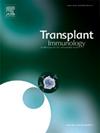HLA class I supertypes and HLA class I alleles influence the outcome after allogeneic hematopoietic stem cell transplant from unrelated matched donor
IF 1.4
4区 医学
Q4 IMMUNOLOGY
引用次数: 0
Abstract
This retrospective study analyses the impact HLA heterozygosity, supertypes, and alleles have on incidence of graft versus host disease (GvHD), relapse, overall survival (OS), disease-free survival (DFS) and transplant-related mortality (TRM) after HSCT. The study included patients who underwent HSCT, typed at allele resolution level for HLA-A, -B, -C, -DRB1, -DQB1, and -DPB1 loci. The analysis performed on the entire patient cohort (N = 232) showed that HLA-B07 supertype positive patients demonstrated decreased incidence of relapse, better OS and DFS in comparison to those negative for HLA-B07 supertype. Further, a higher incidence of TRM was observed among patients positive for HLA-B27 supertype. Significant association of the HLA-A*02:01 allele presence with decreased incidence of GvHD was found. The occurrence of HLA-A*11:01 allele was associated with a worse OS, DFS and a higher rate of TRM.
The analysis of the subgroup of patients with AML or MDS (N = 148) showed an association of HLA-A24 supertype with a worse OS. The HLA-B07 supertype positive patients demonstrated a lower incidence of relapse and a better DFS. A decline in OS and a higher TRM rate were observed among patients positive for HLA-B27 supertype. The presence of HLA-A*11:01 allele was indicative of a worse OS, DFS and a higher rate of TRM.
The associations of HLA and HSCT clinical outcome parameters found in this study justify further investigation of this matter.
HLA I类超型和HLA I类等位基因影响非亲属匹配供体异体造血干细胞移植的预后。
本回顾性研究分析了HLA杂合性、超型和等位基因对移植后移植物抗宿主病(GvHD)、复发、总生存期(OS)、无病生存期(DFS)和移植相关死亡率(TRM)的影响。该研究包括接受HSCT的患者,按HLA-A、B、C、-DRB1、-DQB1和-DPB1位点的等位基因分辨率进行分型。对整个患者队列(N = 232)进行的分析显示,与HLA-B07超型阴性患者相比,HLA-B07超型阳性患者的复发率降低,OS和DFS更好。此外,在HLA-B27超型阳性患者中观察到更高的TRM发生率。发现HLA-A*02:01等位基因存在与GvHD发病率降低有显著关联。HLA-A*11:01等位基因的出现与较差的OS、DFS和较高的TRM发生率相关。AML或MDS患者亚组分析(N = 148)显示HLA-A24超型与较差的OS相关。HLA-B07超型阳性患者的复发率较低,DFS较好。在HLA-B27超型阳性患者中,观察到OS的下降和更高的TRM率。HLA-A*11:01等位基因的存在预示着较差的OS、DFS和较高的TRM率。本研究中发现的HLA和HSCT临床结果参数的关联证明了对这一问题的进一步调查。
本文章由计算机程序翻译,如有差异,请以英文原文为准。
求助全文
约1分钟内获得全文
求助全文
来源期刊

Transplant immunology
医学-免疫学
CiteScore
2.10
自引率
13.30%
发文量
198
审稿时长
48 days
期刊介绍:
Transplant Immunology will publish up-to-date information on all aspects of the broad field it encompasses. The journal will be directed at (basic) scientists, tissue typers, transplant physicians and surgeons, and research and data on all immunological aspects of organ-, tissue- and (haematopoietic) stem cell transplantation are of potential interest to the readers of Transplant Immunology. Original papers, Review articles and Hypotheses will be considered for publication and submitted manuscripts will be rapidly peer-reviewed and published. They will be judged on the basis of scientific merit, originality, timeliness and quality.
 求助内容:
求助内容: 应助结果提醒方式:
应助结果提醒方式:


